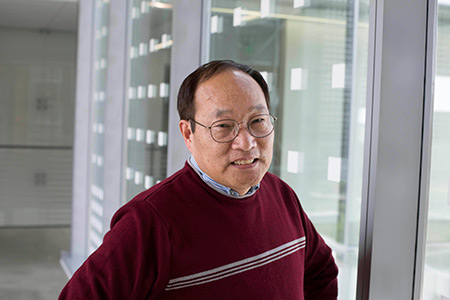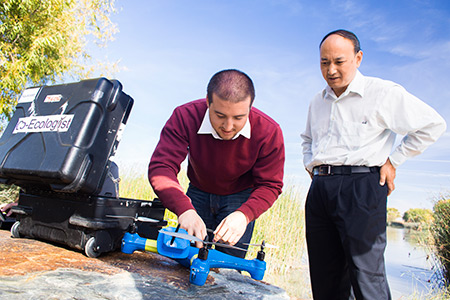 As agriculture and food production achieve greater high-tech heights and resources such as water become more scarce, the country will increasingly depend on innovative solutions from its brightest minds.
As agriculture and food production achieve greater high-tech heights and resources such as water become more scarce, the country will increasingly depend on innovative solutions from its brightest minds.
A new initiative at UC Merced aims to poise today’s students at the leading edge of the nexus of food, energy and water (FEW) to help create answers to the future’s most pressing concerns.
AgTech, funded by a grant for Hispanic Serving Institutions from the U.S. Department of Agriculture (USDA) and the National Institute of Food and Agriculture (NIFA), is a new educational effort spearheaded by professors Jian-Qiao Sun, YangQuan Chen and Theofanis Tsoulouhas.
“This project is one of several new efforts to increase the use of technologies to improve agricultural operations,” School of Engineering Dean Mark Matsumoto said. He pointed to several recent sustainability-related FEW projects, such as Robot Assisted Precision Irrigation Delivery and Agricultural Waste Utilization through Low-Cost Activated Carbon Produced from Local Biochar, both of which came about because of NIFA grants to professors Stefano Carpin and Gerardo Diaz, and a remote and autonomous sensing project for managing economic and environmental consequences of salinity-impacted waterways, led by Professor Joshua Viers.
 Sun and Chen are teaching cutting-edge mechanical engineering principles to enable undergraduates to design solutions, while Tsoulouhas is teaching the entrepreneurial foundations to help them start their own businesses.
Sun and Chen are teaching cutting-edge mechanical engineering principles to enable undergraduates to design solutions, while Tsoulouhas is teaching the entrepreneurial foundations to help them start their own businesses.
“You actually need a lot of education to be a successful farmer these days,” Sun said. “The days of just putting some water on the fields are long behind us.”
Advanced technologies, including computers, electronics, communications, energy and water monitors and sensors, and unmanned aerial vehicles — drones — have fundamentally changed the agricultural and food industries. Growing concerns about public health and climate change mean greater emphasis on precision agriculture applications that help farmers leave smaller footprints, manage resources responsibly and maximize output.
“Drones are critical to farming today,” Chen said. “They are tractors 2.0. Everyone needs one.”
 For example, drones can be used to monitor the health and moisture levels of soil and crops, deliver precision sprays of seeds or fertilizers, play acoustic bird deterrents that don’t disturb humans, release “biological enemies” that will eat pests rather than spraying pesticides, and can even be made small enough to act as pollinators.
For example, drones can be used to monitor the health and moisture levels of soil and crops, deliver precision sprays of seeds or fertilizers, play acoustic bird deterrents that don’t disturb humans, release “biological enemies” that will eat pests rather than spraying pesticides, and can even be made small enough to act as pollinators.
Drones could provide farmers with an enhanced workforce, complementing human workers.
“Between mechanical engineering and management, we hope to teach the students and inspire them to be able to make money though FEW-related businesses,” said Sun who, like Chen, is with the School of Engineering. “We’re quite excited about the opportunity to work across disciplines to further research, education and practical applications.”
Tsoulouhas, a finance professor with the School of Social Sciences, Humanities and Arts, is developing programs in entrepreneurship, management, finance and economics to teach students the skills necessary for modern agriculture so they can start new agricultural technology companies and service-providing businesses in the San Joaquin Valley.
“We want to encourage the entrepreneurial mindset and give them a greater understanding of practical demands such as market analyses, business-plan development, managing innovation and change, financing entrepreneurial ventures, branding and marketing, and leadership skills,” he said. “I plan to train the students in using innovation and entrepreneurship tools, with an emphasis on food processing, which is of particular importance in our area.”
The professors have already begun incorporating special topics in their engineering and management classes. Engineering students in specific classes will gain more knowledge about mechatronics and mechanics; vibration and control of machinery and precision farming machines; intelligent farming and food-processing systems; sensors for crop field surveys; drone flight control; data retrieval and processing; data-based modeling and optimization; and cloud storage and computing.
The $275,000 grant will support five or six undergraduate student fellows for six weeks each summer in which they will get extra exposure to advanced technologies in today’s farming and food industries, and be introduced to major food-related companies in the area to get a better understanding of how those technologies are applied now and could be in the future.
One of the first public debuts of the new effort, though, came at the Center for Information and Technology Research in the Interest of Society’s (CITRIS) second annual Agricultural Technology Fair last week. Chen spoke about the future of ag-tech research and #UAS4STEM educational ecosystem at UC Merced.
A week later, the deadline closes for applications for the summer fellowships, which pay $2,000 per student, Sun said.



